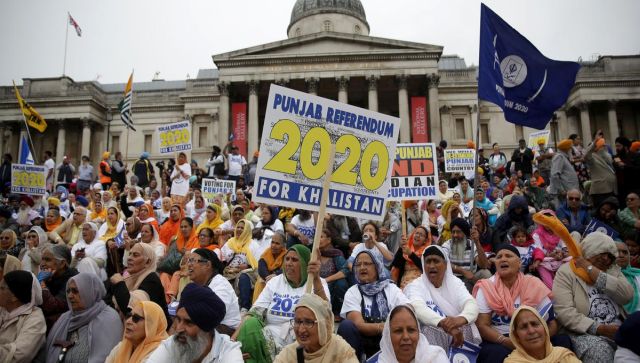In a blow to India, Interpol has rejected India’s request to issue a Red Corner Notice (RCN) on terror charges against Canada-based Khalistan separatist Gurpatwant Singh Pannun. This is the second time India’s demand has been turned down.
Indian authorities have not supported their case against Pannun, the founder and legal advisor of the pro-Khalistan outfit Sikhs for Justice (SFJ), according to a report by The Indian Express.
Who is Gurpatwant Singh Pannun?
Pannun reportedly hails from Khankot, a village in Punjab’s Amritsar district. A law graduate from Panjab University, he holds a master’s degree from Touro Law College in New York and an MBA from the University of Hartford. He is around 50 to 52 years old, according to the Punjab Police dossier.
The lawyer founded SFJ, a group that calls for an independent “Khalistan” carved out of India, in 2007 in the United States. The outfit has been outlawed in India.
The SFJ aims to be “an international advocacy and human rights group with the express intent of achieving self-determination for the Sikh people in their historic homeland in the region of Indian-held Punjab and establishing a sovereign state, popularly known as Khalistan”.
In 2014, Pannun started filing cases against Indian politicians travelling to the United States or Canada, including Prime Minister Narendra Modi, former PM Manmohan Singh, Congress chief Sonia Gandhi, Shiromani Akali Dal’s Sukhbir Singh Badal.
Former Punjab chief minister Amarinder Singh had to cancel his Canada visit in 2016 because of a case filed against him.
Why does India want a Red Corner notice against Pannun?
An RCR is an international document issued by Interpol against wanted persons, requesting law enforcement agencies around the world to locate and temporarily detain a suspect until their extradition, surrender, or other legal action. However, it is not an international arrest warrant.
In May, after Khalistan flags were found hanging at the gate of the Himachal Pradesh Vidhan Sabha, the state police said that they had sought an RCR against Pannun. He has been accused of sending misleading and threatening messages to journalists and public representatives. In July 2021, the separatist leader threatened to obstruct the hoisting of the national flag in the state on Independence Day, Himachal director general of police Sanjay Kundu had said.
#WATCH Khalistan flags found tied on the main gate & boundary wall of the Himachal Pradesh Legislative Assembly in Dharamshala today morning pic.twitter.com/zzYk5xKmVg
— ANI (@ANI) May 8, 2022
Pannun has been booked in 22 cases in Punjab between July 2017 and August 2022 and has been accused of sedition, rioting, terror and more, reports The Indian Express. He has been booked under sections of the Unlawful Activities (Prevention) Act (UAPA) and the Arms Act, Indian Penal Code sections 153A, 121 (waging, or attempting to wage war, or abetting waging of war, against the Government of India), among others.
In 2018, he announced a “Referendum 2020” “to liberate Punjab that’s currently occupied by India” in London. A year later, SFJ was banned by the Indian government under UAPA. The home ministry had noted then, “In the garb of the so-called referendum for Sikhs, SFJ is actually espousing secessionism and militant ideology in Punjab, while operating from safe havens on foreign soils and actively supported by inimical forces in other countries.”
Pannun was designated as a terrorist under UAPA in 2020, along with eight others. The Centre had said, “These individuals are involved in various acts of terrorism from foreign soil. They have been trying to revive militancy in Punjab.”
However, his “anti-India” activities have continued. In April 2020, he was booked by the Punjab Police for sending pre-recorded audio messages alleging that the Centre and Punjab government were “torturing” youth in the name of the COVID-19 lockdown. He has been booked under the IT Act after a Facebook group propagated “anti-national activities” of SFJ regarding “Referendum 2020”, The Indian Express reports.
In February 2021, the National Investigation Agency (NIA) filed a charge sheet against Pannun related to a case where SFJ activists removed the Tricolour installed at the DC complex in Punjab’s Moga, and installed the “Khalistan flag”.
The SFJ founder has been booked in several cases for propagating the Khalistan agenda in Punjab, from vandalising property with slogans and distributing pamphlets.

Why did Interpol reject the request for RCN?
While Interpol acknowledged that Pannun is a “high-profile Sikh separatist”, they said his activities have a “clear political dimension”. Hence, an RCN cannot be issued against him as per Interpol’s Constitution, reports The Indian Express.
According to the Interpol Commission, the National Central Bureau (NCB) provided “insufficient information” to show the “terrorist nature of the crime” and also Pannun’s “possible active and meaningful involvement in terrorist activities”, the newspaper report said.
India filed the request for an RCR on 21 May 2021 through the NCB on behalf of the National Investigation Agency (NIA). It cited an arrest warrant issued against him by a special NIA court in Mohali on 3 February 2021 in its submission to Interpol. It was stated that the NIA’s investigation “established” that Pannun had used a friend named Nihal Singh alias Fateh Singh on social media platforms to “recruit”, “radicalise”, and “task” other accused to commit "terror acts," according to sources.
However, Pannun rejected the charges in his application and said India’s request was a move to “silence” activists”, sources told The Indian Express. He also denied that SFJ was a terror organisation.
With inputs from agencies
Read all the Latest News, Trending News, Cricket News, Bollywood News,
India News and Entertainment News here. Follow us on Facebook, Twitter and Instagram.
from Firstpost India Latest News https://ift.tt/Eey2hko
No comments:
Post a Comment